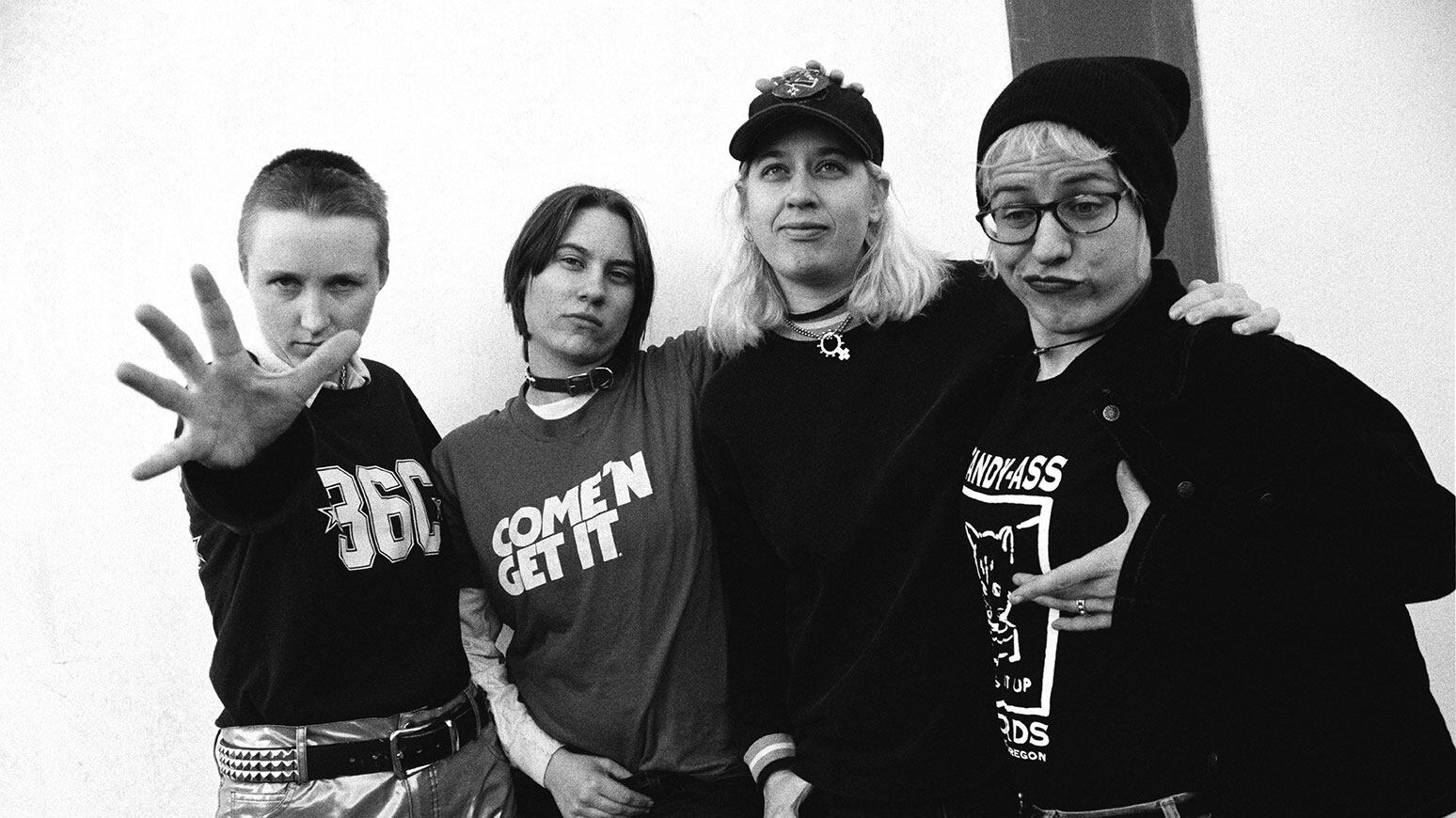Social change seems to have caught up with Team Dresch.
In the mid-'90s, the Olympia, Wash.-founded, Portland-based quartet began releasing melodic, ferocious and unabashedly political punk. Team Dresch was invaluable to riot grrrl and queercore punk. Comprising guitarist Donna Dresch, singer Kaia Wilson, bassist Jody Bleyle and drummer Marcéo Martinez, the band wrote tight, catchy anthems about battling depression and opposing anti-LGBTQ+ legislation, odes to queer love and a ballad about a mom who cries when her daughter shaves her head. Sleater-Kinney and Tracey and the Plastics are among the bands who owe their launch to Dresch's Chainsaw Records. But during Team Dresch's initial run, music journalists who emphasized the scarcity of women in rock never seemed as eager to write up the all-queer Team Dresch, whose stances on social issues were too out-there for gatekeepers of anesthetized '90s nostalgia.
The group has sporadically reunited since it disbanded in the late '90s. But earlier this month, Team Dresch reissued their entire catalog on Portland label Jealous Butcher: 1995's Personal Best, 1996's Captain My Captain and a single compilation album. The reissues make Team Dresch visible and accessible to new generations of music lovers who want to balance fun and political music, and interrupts the algorithms that once excluded the band.
This week, Team Dresch plays two-sold out shows in Portland during Pride Weekend in celebration of the re-release of their catalog. In case you've missed Team Dresch up to this point, here are the biggest takeaways from the reissues.
Twenty years later, Team Dresch still sounds contemporary.
Team Dresch always comes back when they're most needed, whether they're celebrating Pride, resisting neo-fascists or restating their case as some of the Pacific Northwest's most important queer artists. Last week, the band released "Your Hands My Pockets," their first new single in almost 20 years. The song is a more studio-polished but no less daring addition to their repertoire. It makes you want to dance like your best high school punk self, and the construction sounds like a missing link to your favorite '90s bands.
Team Dresch might be the most fun political band out there.
At its worst, political music can feel like a civics lesson sing-along. Team Dresch is different. The political content is all there, but you notice Team Dresch's structural work before their message. They're more radical than Bikini Kill and less dance pop than Le Tigre. They don't have Hole's high angst, L7's tougher-than-the-boys ethos, or Babes in Toyland's creepcore abrasiveness. Still, Personal Best and Captain My Captain document queer experiences with a clarity still rare today. Lucy Thane's 1997 riot-grrrl documentary, She's Real, included Team Dresch concerts among shows where fans could finally feel free and heard. If you attend their Mississippi Studios shows this week, be prepared to sweat.
Team Dresch held Oregon accountable for homophobia.
Washington, namely Seattle and Olympia, is most associated with '90s rock, but Team Dresch memorialized Oregon within the queercore movement—just not in a way we should be proud of. Team Dresch has a few songs about the inspiration for The Simpsons' hometown, including "Growing Up in Springfield," a visceral song about a mother's reaction to her lesbian daughter. "Hate the Christian Right!" was written as a direct response to Springfield's status as the first U.S. municipality to include homophobic language in its city charter. The language was later removed, deemed unconstitutional by the Oregon Court of Appeals, but Team Dresch's song distilled a moment that ultimately inspired the push for LGBTQ+ rights across the state.
Team Dresch deserves unqualified recognition.
The renewed interest in Team Dresch's discography demonstrates they still have a loyal following and one that wants to see them included among the most important figures in rock history. Yes, Pitchfork included Team Dresch—along with Patti Smith, Sonic Youth and PJ Harvey—as one of the most important voices in feminist punk. But the band deserves recognition alongside musicians whose gender is never taken into consideration (read: men) without qualifiers like "female" and "queer." It's still important to acknowledge those canons, especially as a means of compensating for when such perspectives weren't considered at all. But music fans and journalists need to stop treating labels as a means of exclusion. Team Dresch may not have enjoyed the commercial success of some of their peers, but their contributions to punk music are no less significant. The reissue offers a chance for new listeners who strongly relate to the band's sound and perspective to find them for the first time. Hopefully, that will inspire more art and music that continues the work Team Dresch helped to start.
SEE IT: Team Dresch plays Mississippi Studios, 3939 N Mississippi Ave., mississippistudios.com, on Friday and Saturday, June 14 and 15. 9 pm. Sold out. 21+.
Related: Portland Queercore Legends Team Dresch Are Coming Back Just When the World Needs Them Most

